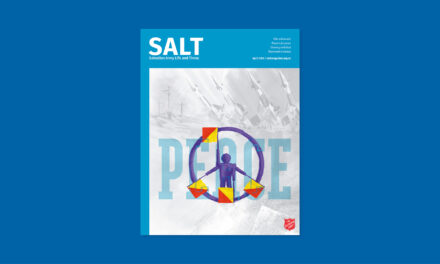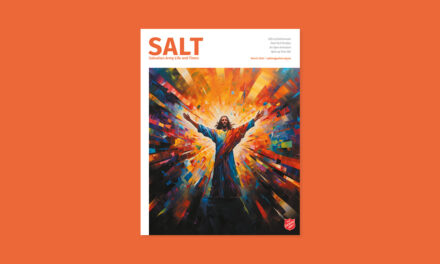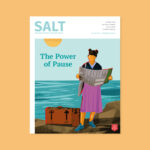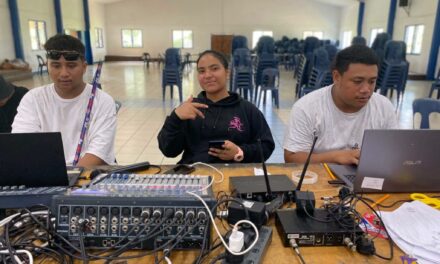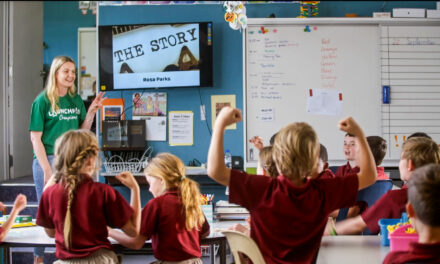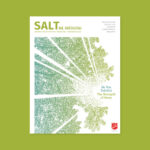
Punching Above Our Weight Since 1883: Celebrating 140 Years in New Zealand
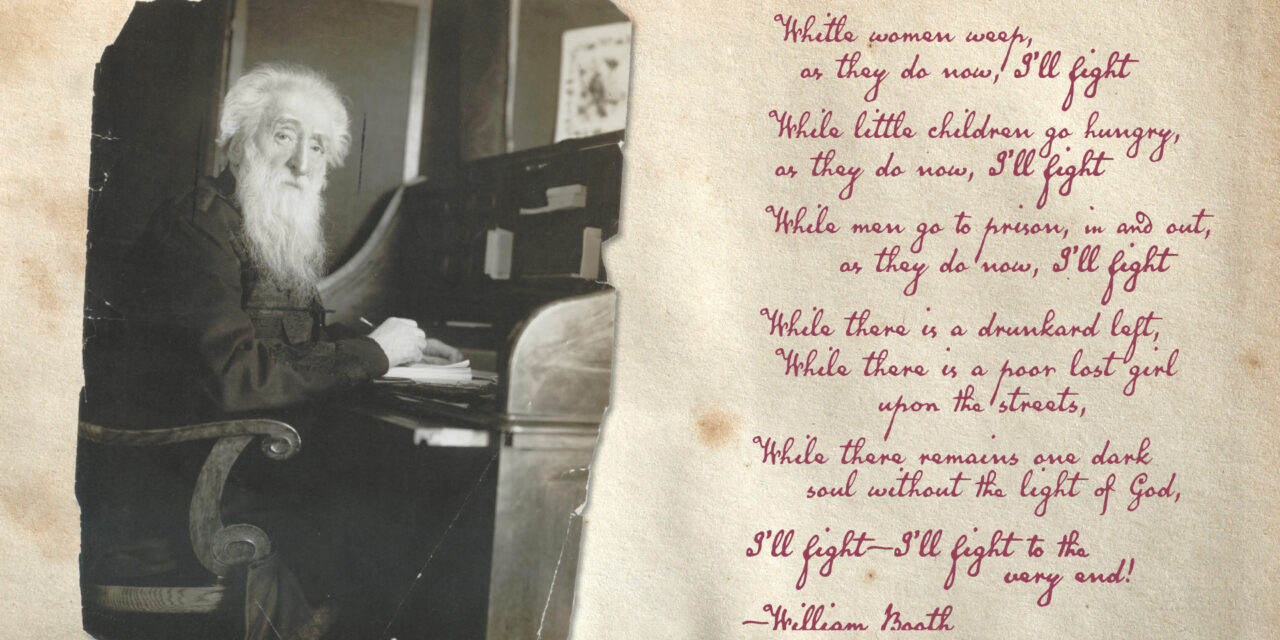
The Salvation Army has been hard at work, supporting communities and sharing the gospel in New Zealand for the past 140 years. War Cry looks back over the legacy of the Army in Aotearoa through the lens of General William Booth’s ‘I’ll Fight’ speech.
‘Bringing a Salvationist to New Zealand will be another of the many mistakes … It is the thistles, the sparrows and rabbits over again. The Army will prove a nuisance as troublesome as these pests and as ineradicable.’ Otago Daily Times, 6 January 1883.
It is both fitting and fated that the comparison made of the Army with thistles, sparrows and rabbits by the Otago Daily Times would not only prove true in terms of proclivity and permanence, but also intensify the passion of young Englishmen, 20-year-old Captain George Pollard and 19-year-old Lieutenant Edward Wright, sent to New Zealand to start the work of The Salvation Army. Their mission was clear, the strategy simple: ‘You go to Auckland in the far north,’ said Pollard to Wright, ‘and I’ll go to Dunedin in the south; we’ll work towards Wellington and shake hands when we get there.’
Despite persistent press ridicule and fierce public opposition, the message preached by the young officers quickly took root. Within just nine months, 5000 converts, 600 soldiers and 30 officers (including many women), gathered in Dunedin for the Army’s first New Zealand ‘congress’.
Now, 140 years on, The Salvation Army is firmly established in Aotearoa. The Sallies remain not only a trusted brand but a well-respected community presence and steadfast expression of practical Christianity. No longer seen as a pest to be eradicated but instead embraced as a dogged combatant against poverty and injustice.
A fighting chance
However, while many join the mission as employees with specialised skills, or as volunteers desirous of investing their time doing something meaningful, a smaller number of officers and soldiers than ever before serve the mission. Could it be that The Salvation Army of 2023 faces a similar challenge to that of 1883? A small number up against seemingly insurmountable odds? Or is this challenge a new opportunity as people of faith and passion step up to fill what have historically been officer roles? Either way, history makes it clear that the Army does its best work when backed up against a wall, and the Bible reveals the same—time and time again. As David faced Goliath, his battle plan had nothing to do with his stature or the availability of resources and everything to do with the size of his faith and belief that the battle belonged to the Lord.
A few months before his death in 1912, General William Booth gave his final and now famous ‘I’ll Fight’ speech. The Army had expanded to 58 countries in just 60 years; in 2023 that figure now sits at 132 and counting. Booth’s speech not only encapsulated the essence of the Army’s vision and mission but emphasised that the fight was primarily for people—the social and spiritual freedom of the oppressed.
One hundred and forty years after Pollard and Wright shook hands in Wellington, the call to fight against injustice and for the marginalised of New Zealand is as real as ever. The shape and scope of that fight continues to adapt and change, pivot and expand, but all the while The Salvation Army in New Zealand responds by punching above its weight. In celebration of 140 years of fighting the good fight, we pause to reflect on those impassioned words and offer a progress report on Booth’s call to action.
While women weep as they do now, I’ll fight!
‘Last year in New Zealand, police investigated almost 180,000 incidents of family violence,’ reports Ingrid Barrett, Gender Equity Advocate for The Salvation Army. ‘Women still suffer greatly from sexual violence and women are over-represented in poverty statistics. But we do know that when women are lifted out of poverty, or lifted into education or employment, the whole of society benefits, and outcomes for future generations change,’ she explains.
In response to ongoing family violence in Aotearoa, Women’s Ministries adopted the Shielded Site logo, from Women’s Refuge. Women experiencing violence can reach out for help online without their search history being revealed to controlling and abusive partners. Women’s Ministries continues to promote recognition of the Shielded Site logo (pictured on page 23), and recently, women from Manurewa Corps Plant began a free community store for women only, so that those experiencing family violence can shop safely. ‘Jesus defended women, listened to women and gave women the right to be disciples—even raising some like Mary of Bethany to the status of prophet. Jesus set the scene for how women are to be treated and lifted,’ says Ingrid. ‘And his example motivates me to keep fighting for women!’
While little children go hungry, as they do now, I’ll fight!
‘A rage of injustice rises within me that children go without the most basic necessity of life in this country, when as a nation we can feed everyone six times over,’ says Jono Bell, territorial director of Community Ministries. ‘But I also feel privileged because literally every day of the week we get to provide love and care through kai (food) to our most vulnerable tamariki (children).’
Jono explains that as well as providing the basics, Community Ministries offers a lot of development work, like parenting programmes. ‘We now partner with The Parenting Place, and parenting is a massive focus for us in 2023,’ explains Jono. ‘Social work and advocacy for families stem from there. We have over 600 children in transitional housing in Auckland alone, and the work our youth workers are doing there is phenomenal. Broadly speaking, making sure that families are healthy and thriving and that whānau (families) have the skills and abilities to really understand their children, as well as access support when needed—that’s the work I’m really proud of.’
While men go to prison, in and out, as they do now, I’ll fight!
‘We have proven that if you love and care for people and treat them with dignity and respect, change is possible and good things do happen,’ says Glen Buckner, national operations manager for Reintegration Services. ‘Our purpose is to reduce opportunities for people to go back to prison by helping them with the necessities of life—a home, job and, most of all, support from caring supportive people who aren’t going to judge them, all while also holding them accountable around making decisions to help better themselves—learning from their past mistakes and take that learning forward into life.’
The Salvation Army’s current Reintegration Services began as a strategic opportunity to work with government and local communities to make lasting change, and is now seen as a vital service by the public. Wraparound services provided through local corps and Community Ministries, as well as supportive accommodation, Family Stores, budgeting and Bridge recovery services all assist the work of Reintegration Services. This is the He Waka Eke Noa—All of Us Together— expression of Army services and ministry working together to engender change in a person’s life.
While there is a drunkard left, I’ll fight!
‘I remain captivated by this call,’ says Mike Douglas, national operations manager for Bridge services. ‘While even one person remains afflicted with the stigma, harm, abuse, violence and devastation that comes through alcohol and drug use, I’m called to action, to fight.’
The Salvation Army is a leading provider of alcohol and other drug harm reduction services and uses a range of effective, evidence-based support services. Mike is especially proud that Bridge welcomes diversity as well as promoting and practicing a holistic approach to healthcare that includes the exploration of spirituality.
‘We provide tāngata whaiora (people seeking wellness) and their whānau with a safe place to belong where personal choice is encouraged. We provide recovery information and practical tools communicated in meaningful ways which are culturally appropriate. Our services are delivered by a range of professional kaimahi (staff) who bring a combination of clinical knowledge, cultural worldviews and lived experience, and who work with our tāngata and whānau to provide a variety of wraparound support services,’ explains Mike.
While there is a poor lost girl upon the streets, I’ll fight!
Fighting for freedom from exploitation for women and girls remains a fight for all Salvationists to engage with. The Salvation Army emphatically rejects the commodification of women and girls in any circumstance, including prostitution, pornography and sex trafficking. Furthermore, The Salvation Army recognises that women and girls are drawn into prostitution by conditions that include poverty, addiction, trauma and coercion. The Army, therefore, affirms that prostitutes should not be treated as criminal offenders but treated with value and dignity. The Army supported the decriminalisation of prostitution in New Zealand, advocating for systemic change.
Here in New Zealand sex trafficking exists, with Women’s Ministries reporting an estimated 3000 people in modern slavery, and this statistic sadly includes 12- to 13-year-old girls lured by ‘boyfriend figures’ who use violence to sell them for sex. Internationally, The Salvation Army works to assist women and girls (and young boys) vulnerable to trafficking through the ‘Fight for Freedom’ framework, which includes advocating for systematic change (tinyurl.com/TSAFreedom).
While there remains one dark soul without the light of God, I’ll fight!
‘One of our real challenges in a season where the traditional model of church seems to be struggling in much of the Western world is figuring out what it means to be a Christian community that offers a meaningful connection to the gospel story,’ says Major Ian Gainsford, territorial director for Mission.
Ian explains that the Mission team are working on tools for expanding options for evangelistic ministry and models of faith community. ‘We see significant fruit in our recovery fellowships, and intentional missional engagement in our social housing. We see exciting possibilities in community engagement models in places like Manurewa. We see substantial, faithful passion in many of our corps to keep fighting to embody the love of Christ that draws people to hope and wholeness and life. We will keep dreaming, keep striving, keep praying and keep fighting!’
I’ll fight to the very end…
‘For me, Booth’s call to fight keeps me lazer focused on who we are called to be as The Salvation Army,’ says Territorial Leader Commissioner Mark Campbell. ‘We are still about the marginalised of society—that is who God calls us to be as The Salvation Army. I believe God will continue to use us if we keep focused, stay determined and be ourselves—play our particular God-given part in the kingdom. We are Te Ope Whakaora—the Army that brings life—and for me there is a spirit of determination underlying that to keep fighting—fighting to the very end!’

